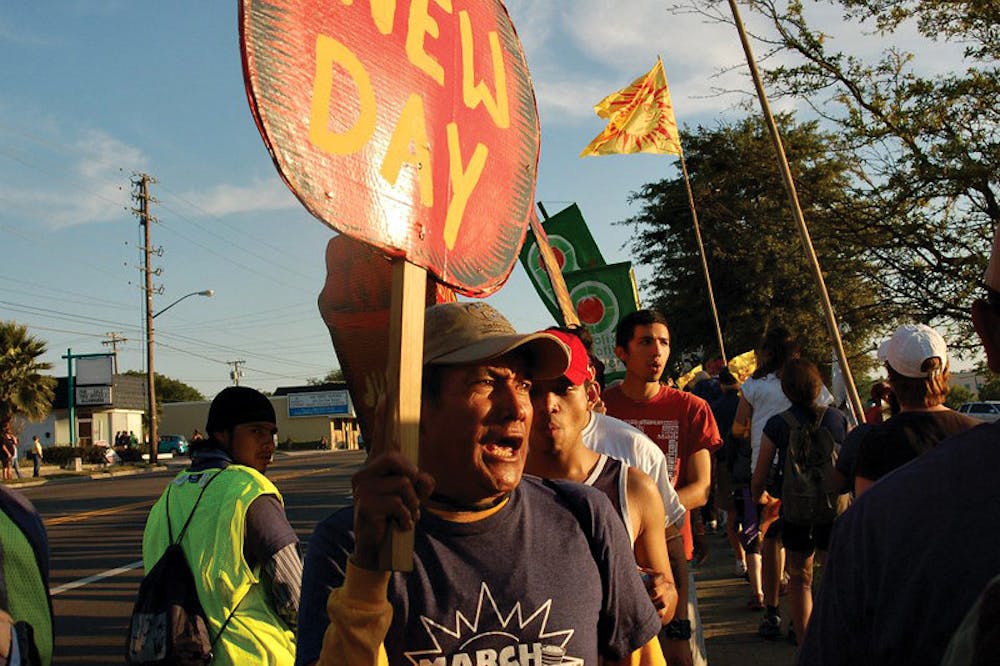Five members from the Student Labor Alliance traveled to Florida to take part in a march held March 14-18 to protest corporations’ alleged abuse of farm workers in the state.
The students joined the Coalition of Immokalee Workers, a pro-workers’ rights advocacy group, to walk part of the coalition’s March for Rights, Respect and Fair Food, which follows a 200-mile route starting in Fort Myers, Fla. to the corporate headquarters of the supermarket chain Publix in Lakeland, Fla. every ten years.
Activists targeted Publix for demonstrations this year because they claim the company is involved in a form of “modern-day slavery” by underpaying farm owners for their produce, causing farmers to pay substandard wages to their employees, said Shelby Mack ’14, SLA member and march attendee.
The coalition “works towards improving the lives of their community,” Mack said, adding that the group has made an impact by securing wage increases for farm workers and human rights codes for laborers.
“The SLA had two primary goals with this march,” Mack said. “We wanted to celebrate all the successes that this coalition has held and to continue putting pressure on Publix.”
Students said they wanted to participate in the march because of the need to expose what they deemed Publix’s unfair treatment of workers.
“Publix ... claims to treat their employees with respect and dignity,” said Tomas Quinonez-Riegos ’15, an SLA member who took part in the march. He added that though Publix indirectly sets low wages for farm laborers by underpaying their employers, the company unfairly does not consider these laborers to be on their payroll.
Quinonez-Riegos charged Publix, which touts its commitment to ethical business standards, with hypocrisy regarding its labor practices.
“One of its main corporate tenets is that it’s faith-based, which is ironic,” he said.
“These corporations — food service, supermarket and fast food companies — have the power to improve conditions in the fields,” Mack said. “The growers don’t have more money to pay these farm workers unless these corporations pay more for their produce,” she added.
The Coalition of Immokalee Workers aims to increase farm workers’ wages by 75 percent by pressuring their employers to sign what its members call the Fair Food Agreement. The terms of this agreement commit corporations to implementing safer working conditions and giving their workers “a voice,” Quinonez-Riegos said.
Students who attended the march said they felt the experience was emotionally powerful.
Mack said she believed the coalition’s actions have been successful, adding that 11 corporations have already signed the Fair Food Agreement. But she noted Publix continues to resist signing the agreement.
Marching in Florida has given SLA members a new perspective on organizing activism in the local community, Quinonez-Riegos said.
Mack said the CIW and SLA are now working on a joint campaign in Rhode Island to pressure Wendy’s and Stop & Shop to sign the Fair Food Agreement.
“Wendy’s is the final one of the top five fast food chains in America not to sign on to this agreement,” Mack said, expressing her hope to carry the organizing spirit from Florida to Rhode Island.
A previous version of this article incorrectly stated that the Coalition of Immokalee Workers’ March for Rights, Respect and Fair Food occurs annually. In fact, the march occurs once a decade. The Herald regrets the error.
Editor's note: The Herald was unable to verify the accuracy of certain quotes in this article. Those quotes have since been removed. The Herald strives for accuracy in all its reporting. We apologize for the error.

ADVERTISEMENT




